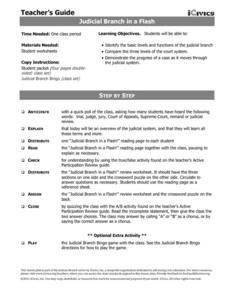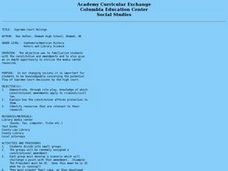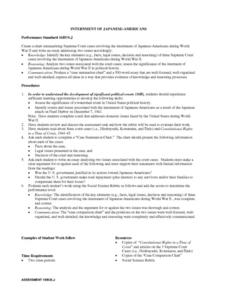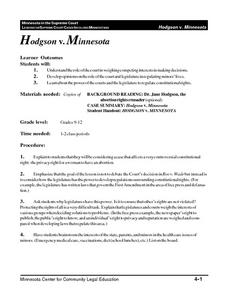Curated OER
A Look At The Current Court
Pupils examine the characteristics of Supreme Court Justices. Using the interent, they research current effects effecting the Court. They complete a worksheet after examine the biographies of the justices. As a class, they discuss the...
Curated OER
Supreme Court: Background
Students explain the role of the Supremem Court under the Constitution. They explore current evetns related to the Constitution and read about the roles of the Senate and President in selecting the next justice. They create a chart about...
Curated OER
Michigan Court System (Part 1) (Middle School)
Pupils identify the courts that make up the Michigan judicial system. They explore the responsibility of each court and diagram how cases move to the Supreme Court. They compare and contrast the different types of courts.
Curated OER
Branches of Government: Crossword Puzzle
Reinforce terminology that goes along with the branches of government with this crossword puzzle. There are 17 clues provided. Learners fill in the crossword puzzle with the appropriate answers regarding the legislative, executive, and...
Curated OER
Ohio Statehouse History
Fourth graders examine the history of the Ohio Statehouse and order the major historical events in its development. The lesson traces the development from the time of Ohio's vast wilderness to the house's completion in 1861.
Curated OER
Justices for All
Students examine role of Supreme Court justices in the American political process, research the qualities of the current Supreme Court justices, and write opinion papers evaluating the current justices and recommending future nominations.
Curated OER
Three Branches of Government
In this United States government worksheet, 5th graders examine a diagram of, and read about the three branches of government. They read about the Supreme Court, Congress, and the President before answering 10 online fill in the blank...
Curated OER
You Be the Judge
High schoolers research and evaluate a case considered by the U.S. Supreme Court regarding the jurisdiction of the Clean Water Act. They watch a Bill Moyers video, conduct a debate, and write about the decision they would make if they...
State Bar of Texas
Worcester v. Georgia
Can the president of the United States defy the rulings of the Supreme Court? Students investigate the case of Worcester v. Georgia and the impact it had on society and, most importantly, Native Americans. Using a short video clip as...
Judicial Learning Center
Your 1st Amendment Rights
Why should classes care about the First Amendment? An engaging lesson serves as a powerful tool for answering just that. As all four cases in the lesson relate directly to freedom of expression in schools, young scholars explore the...
State Bar of Texas
Gibbons v. Ogden
Have you ever played the game Monopoly? Do you know what it takes to win the game correctly? Scholars research the nature of outlawing monopolies in the United States while controlling trade. They investigate the court case Gibbons v....
Administrative Office of the US Courts
Hazelwood v. Kuhlmeier
Freedom of speech is not always free. Scholars investigate how the First Amendment provides for the right to express opinions. Through the court case Hazelwood v. Kuhlmeier, they analyze free speech using primary documents—and hopefully...
Curated OER
Indiana Courts: How Do They Work?
Learners identify the branches of Indiana's judicial system and determine the differences between the different courts and different types of cases. Students create a flow chart showing how a court case works its way through the legal...
iCivics
Judicial Branch in a Flash
What is the difference between the federal court and state court systems? What about criminal versus civil cases? Check out this resource that will offer your class members a general and effective overview of the judicial branch in the...
Judicial Learning Center
Article III WebQuest
Why is Article III of the constitution so significant? Pupils discover the importance of Article III and how it relates to past as well as current events by completing Internet research using a provided handout. They learn everything...
Curated OER
Branches of Government
After reading a short text on the branches of government in the United States, future voters answer 8 fill-in-the-blank questions, as well as 11 true or false questions. This activity would be a great homework assignment or silent...
Curated OER
Supreme Court Rulings
Become familiar with the constitution and amendments with an in depth opportunity to utilize media center resources. Groups of students focus on an amendment then make a presentation to the class.
Curated OER
Marbury v. Madison (1803)
Students examine federalism and judicial review. In this Supreme Court lesson, students examine primary documents from Marbury v. Madison and discuss the implications of the decision.
Heritage Foundation
Procedural Amendments: Amendments III, IV, and V
So many US Constitution clauses, so little time. The 17th installment in a 20-part series teaches pupils about the Third, Fourth, and Fifth Amendments. Learning through activities such as group work, connecting to current events, and...
Newseum
Introduction to the First Amendment: What’s a Violation?
Young historians take an in-depth look at the five freedoms granted by the First Amendment. Groups apply their knowledge of the freedoms to a series of scenarios to decide if the depicted actions represent a violation of the amendment.
Judicial Learning Center
Judicial Independence
Most people support the idea of an independent judiciary in theory until they hear about a court case that violates their principles. An informative resource explains why the concept is important. It also provides scholars of criminology...
Curated OER
Internment of Japanese-Americans
Students assess the significance of a watershed event in the political history of the United States . They identify events and issues associated with the internment of Japanese-Americans as a result of the Japanese attack on Pearl Harbor...
Curated OER
Hodgson v. Minnesota
Students investigate the role of and develop opinions of the court in weighing competing interests in making decisions. They examine the power of the courts and legislature to regulate constitutional rights.
Curated OER
When Court Cases Get Appealed
Students read and analyze two functional documents. They predict outcomes using prior knowledge and documents. Students draw conclusions about how court cases are appealed. They list the parts of a court case.























